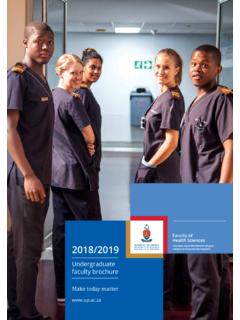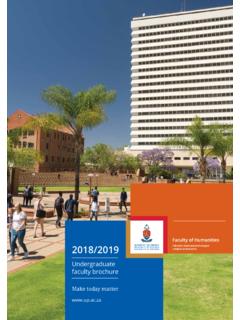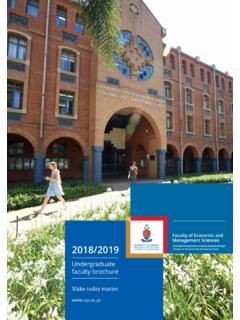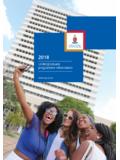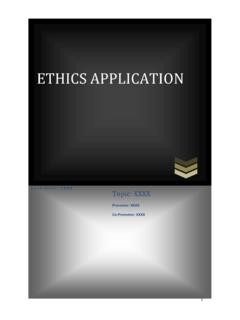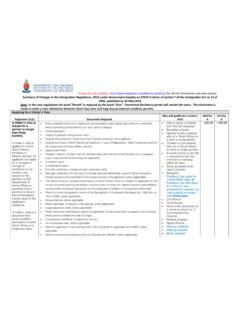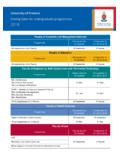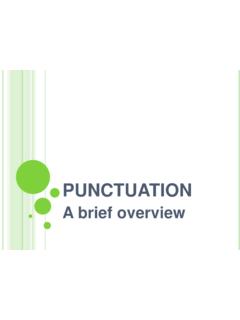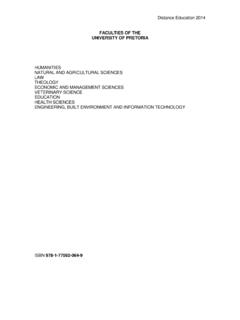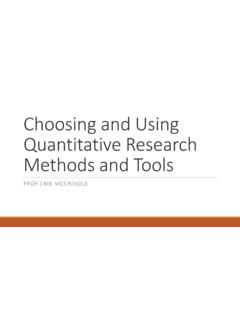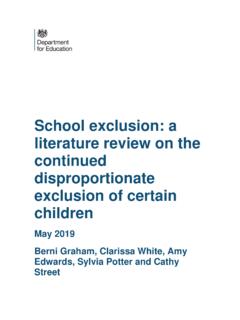Transcription of Postgraduate Certificate in Education (PGCE)
1 Postgraduate Certificate in Education (PGCE). This Certificate is presented in the following fields of specialisation: Senior and Further Education and Training Phase Teaching (Grade 7 to 12). Further Education and Training Phase Teaching (Grade 10 12). Please note: The Department of Higher Education and Training (DHET) has put a policy in place to specify a set of Minimum Requirements for Teacher Education Qualifications (MRTEQ) (Government Gazette no. 38487, 19 February 2015). The requirements for entry to the PGCE (Foundation Phase- and Intermediate Phase Teaching) have become so stringent that student numbers have declined to the extent that these specializations can no longer be offered and will therefore not be available in 2017.
2 A. Requirements for admission An appropriate bachelor's degree or accredited and approved diploma is required for both programmes, with particular requirements in each phase as stipulated below: i. Senior- and Further Education and Training Phase Teaching: One (or more) degree modules passed at a second-year academic level (200) which correspond with one or more relevant subjects at school level for Senior Phase and one (or more) degree modules passed at a third-year academic level (300) which corresponds with a relevant school subject at Further Education and Training Phase Teaching.
3 Ii. Further Education and Training Phase (FET) Teaching: Option A: One degree module passed at a third-year academic level (300) which corresponds with a relevant school subject (check programme modules) AND a research project for students who do not qualify for a 2nd teaching specialization;. Option B: Two degree modules passed at a third-year academic level (300) which corresponds with a relevant school subject. Since degree modules do not necessarily correspond directly with subjects at school level, the Package coordinator (in consultation with the lecturer of the particular specialization) should submit exceptional cases to the Dean.
4 B. Computer literacy All students had to complete a computer literacy course as part of their first degree. If not, it will be expected of students to enrol for such a course concurrently. A computer competence test will take place during orientation to determine which ICT course will have to be taken. C. African language competency All students who successfully complete the PGCE should be partially proficient in at least one official African language or in South African Sign Language, as language of conversational competence.
5 Students will write an exemption examination to determine the language competence. D. Admission requirement shortages A maximum of 32 credits can be allowed concurrently where students do not meet specific admission requirements. Where students require concurrent study the PGCE will not be awarded before proof is submitted that the courses have been completed successfully. E. Demonstration of subject related skills Some school subjects require the demonstration of skills. Candidates who apply may be asked to demonstrate these skills by way of various activities (including theory, practical examination or portfolios).
6 Subjects include: Visual Art; Drama; Music; Computer Application Technology; Information Technology; Design; Engineering Graphics and Design; Geography; Natural Sciences; Physical Sciences and Life Sciences. F. Diploma students All prospective students who hold a 360-credit Diploma have to provide evidence that their Diplomas are approved and accredited by the Department of Higher Education and Training. G. Duration The programme extends over one year full-time. H. Special examinations in the Faculty of Education A final-year student, who has failed a maximum of three semester modules or their equivalent with a final mark of at least 40% in each, may be admitted by the Dean to a special examination in these modules during January of the following year, provided that this will enable the student to comply with all the requirements for the Certificate .
7 I. Programme delivery The PGCE consists of academic and teaching practice components. The academic learning components are presented in the format of integrated modules during which students construct a practice theory of and for Education . The academic components run throughout the year. For the purpose of the teaching practice component, students place themselves in various partnerships schools. The first placement takes place in quarter two for six weeks in a school in the Pretoria region. The second teaching practice takes place in quarter three for six weeks in a different school in the Pretoria region.
8 Students are fully engaged at the schools during teaching practice while they are supported and assessed by qualified mentor teachers and university lecturers. J. Professional development At the end of the year, students will have to submit a professional portfolio showing the integration of all the different modules during an oral examination. The date for submission will be announced at the beginning of the academic year. K. Assessment Continuous assessment is conducted on competence based criteria. Assessment and feedback will be done at the end of the first semester.
9 At the end of the year students will present and defend their professional portfolio before a panel of examiners (internal and external) for final examination. L. Certificate with distinction The Certificate will be awarded with distinction to a student who obtained 75% in each of the Professional development (PPF 401), Facilitating learning (FCL 401) and the specialisation module(s), as well as an average of 75% in all the other modules, with a minimum of 70% per module. Package coordinator: Administrative enquiries: Dr S Coetzee Mrs Ad l Taljaard Tel: +27 12 420 5555 Tel: + 27 12 420 5582.
10 Email: Email: PLEASE NOTE: NO LATE APPLICATIONS WILL BE CONSIDERED and presentation of ALL. programmes are subject to the number of students who qualify as well as the availability of staff. M. The Programme Modules Description Code Credits Fundamental Global and social perspectives in GPE 401 8. modules Education Foundations of Education FOE 401 8. Professional practice JFP 471 3. Core modules Learning theories and assessment in LNT 401 18. teaching Facilitating learning FCL 401 12. Learning support JLD 402 6.
